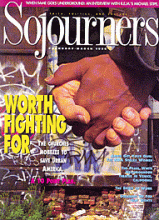Over Thanksgiving weekend in 1973, a group of evangelical Christians met together in the dilapidated Chicago YMCA on Wabash Street. The gathering included both older evangelicals and a new generation who were pressing urgent questions of social justice and peace.
After an extraordinary weekend of vigorous dialogue and relationship building, a document titled "The Chicago Declaration on Evangelical Social Concern" emerged. This benchmark statement of evangelical concern for the world provided legitimation and impetus for many similar initiatives.
But by 1980 a new evangelical foray into politics emerged, known as the "Religious Right." The following years of Jerry Falwells and Pat Robertsons made evangelicalism synonymous with the political Right. The promise of Chicago was effectively derailed - at least in the public perception - by this development. In the meantime, evangelical social concern, especially for the poor, has continued to grow quietly across the country and around the world. This leaves us with a fundamental paradox. Never in this century has there been more evident evangelical commitment to social justice in America than now. Yet, "evangelical" means "right wing" to most people in this country.
That paradox was foremost on the minds of those who gathered again in Chicago on November 19-21, 1993, to commemorate the 20th anniversary of the first Chicago Declaration and to issue a new one. "Chicago Declaration II: A Call for Evangelical Renewal" celebrated the many signs of evangelical commitment to compassion and justice; wept over evangelical complicity in racism, economic oppression, broken family and personal relationships, and escalating violence; and dreamed of an evangel that is truly good news to the poor and proclaims the whole gospel of Jesus Christ.
Another new generation of evangelical leaders was present along with the veterans of 1973.
Read the Full Article
